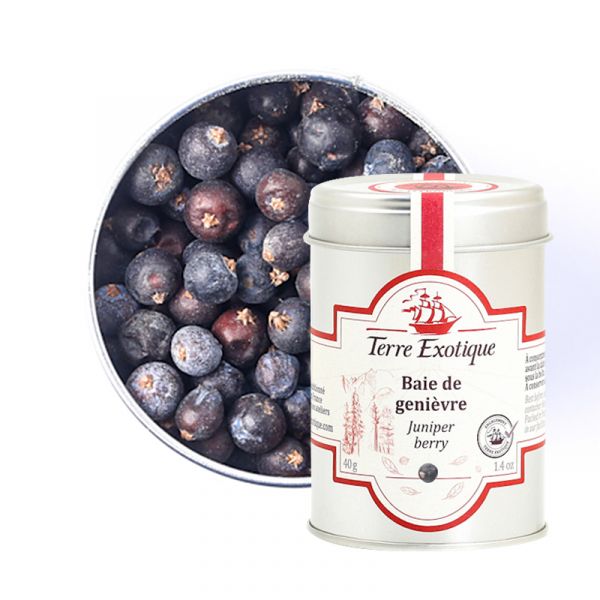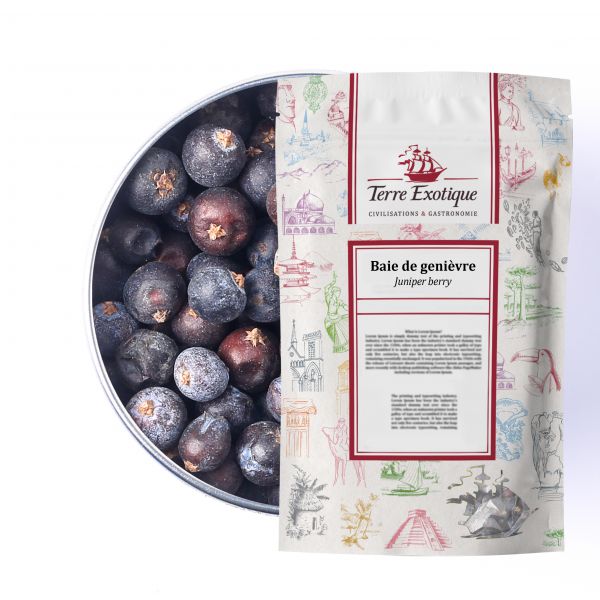



The Intense Aroma of Juniper Berries
Juniper berries have a distinctive and complex aroma, both woody, spicy, and slightly peppery. They emit a warm, earthy smell with hints of pine, licorice, and conifers. This particular aroma comes from the essential oils present in the berries, which are released when crushed or heated.
What Dishes to Use Juniper Berries In?
Juniper berries are commonly used in meat recipes, including game, pork, and beef, as well as in marinades to add subtle warmth.
How to Use Juniper Berries in Cooking?
Here are some recipes:
- - smoked ham with juniper berries: in a large pot, bring your ham to a boil in water mixed with onions, bay leaves, rosemary sprigs, cloves, and your juniper berries;
- - juniper berry potato soup: after cutting your potatoes, sauté them in oil with juniper berries. When reducing to puree, add some juniper berries for extra flavor;
- - juniper berry cocktail: pour 50 ml of London Dry Gin and juniper berries into an ice-filled glass. Finish by gently pouring in the tonic. Add a twist of lemon zest;
- - sauerkraut with juniper berries: swap your usual pepper for juniper berries to intensify the flavor of your sauerkraut;
- - juniper berry sauce for vegetables or meat: to prepare this sauce, mix lightly crushed juniper berries with olive oil, minced garlic, balsamic vinegar, honey, salt, and pepper;
- - juniper berry and citrus jam: soften your juniper berries in warm water for a few hours. In a saucepan, combine the berries with the zest of an orange and a lemon, orange juice, lemon juice, and a cinnamon stick. Add sugar and simmer for 40 minutes. Pour the jam into sterilized jars and let it cool.
Juniper Berries and Their Botany
Juniper berries come from the common juniper, a shrubby plant belonging to the Cupressaceae family. Scientifically known as Juniperus communis, juniper is native to various regions in Europe, Northern Asia, and North America. This evergreen shrub has needle-shaped leaves, greenish flowers, and spherical berries that ripen from green to black or dark blue.
Juniper berries are harvested from these shrubs and are used as aromatic spices in cuisine, especially for seasoning meats and traditional dishes such as game. In addition to its culinary use, juniper is also employed in the distillation industry to produce gin, where juniper berries are one of the main aromatic ingredients used to flavor this alcoholic beverage.
The Historical Journey of Juniper Berries
Juniper berries have a history that dates back millennia, having been exploited by various ancient civilizations. Babylonians, Egyptians, Tibetans, and North American Indians attached great importance to these berries in their sacred rituals, medicinal practices, and even in their cuisine as precious flavorings. The Romans, on the other hand, recognized the potential of juniper berries by using them as a substitute for costly black pepper, Piper nigrum. Juniper berries, equally round and slightly spicy, were an affordable and versatile alternative.
Juniper Berries in Greek Mythology
Juniper berries, with their enchanting scent and unique flavor, were considered an appropriate gift for Hermes. Their dedication to the messenger of the gods symbolized the value and sacred nature of these small berries. By offering juniper berries to Hermes, believers hoped to gain his favor and protection during their journeys, trade negotiations, and daring enterprises.
| Allergen | Absence |
|---|---|
| Native country | ALBANIE |
| Genus and botanical species | Juniperus communis |
| Ingredients | juniper berry |
| TRACES EVENTUELLES D'ALLERGÈNES | céleri, sésame, moutarde, fruits à coques. |
 Français
Français 